At Glowskinhub.com, we believe beauty isn’t just a look—it’s a feeling
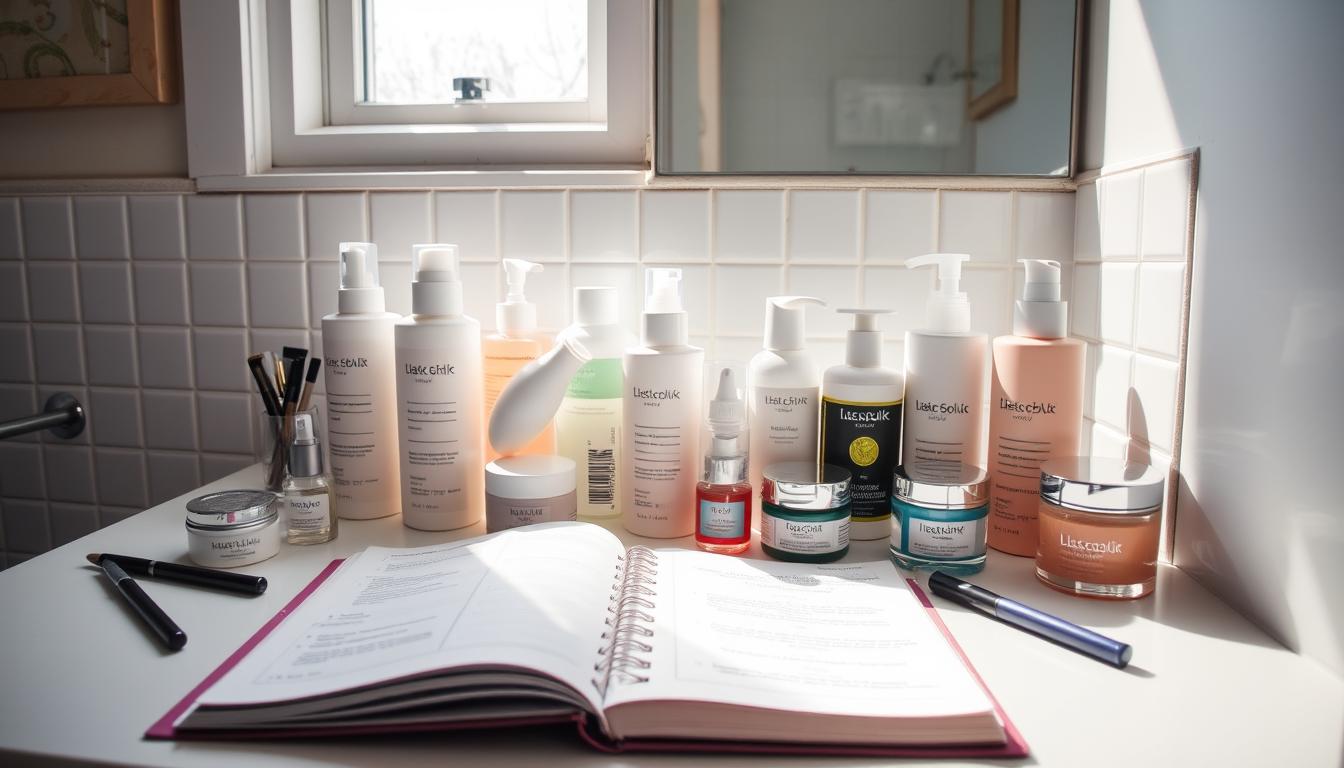
Teenage Skincare Essentials: Your Daily Routine
As a teenager, taking care of your Skin can seem overwhelming. With hormonal changes, stress, and environmental factors affecting your Skin, it’s essential to establish a consistent skincare routine. A well-crafted routine helps to maintain healthy, glowing Skin and prevents issues like acne and hyperpigmentation.
Developing a simple yet effective skincare routine can make a significant difference. By understanding your Skin type and concerns, you can choose the right products and practices to achieve your Skin goals. In this article, we’ll explore the essentials of a teenage skincare routine and provide you with a daily skincare guide tailored to your needs.
Key Takeaways
- Understand your Skin type and concerns to create a personalized skincare routine.
- Use gentle, effective products suitable for your Skin type.
- Establish a consistent morning and nighttime skincare routine.
- Protect your Skin from environmental stressors and damage.
- Be patient and adjust your routine as needed.
Understanding Teenage Skin: Why It Needs Special Care
As teenagers navigate the challenges of adolescence, their Skin undergoes significant changes that require special attention. The teenage years are a critical period for establishing good skincare habits that can last a lifetime.
Hormonal Changes and Their Impact on Skin
Hormonal fluctuations during puberty can lead to an increase in sebum production, potentially clogging pores and causing acne. These changes can be particularly challenging for teenagers, affecting not just their Skin but also their self-esteem. Key factors influenced by hormonal changes include:
- Increased oil production
- Clogged pores
- Acne breakouts
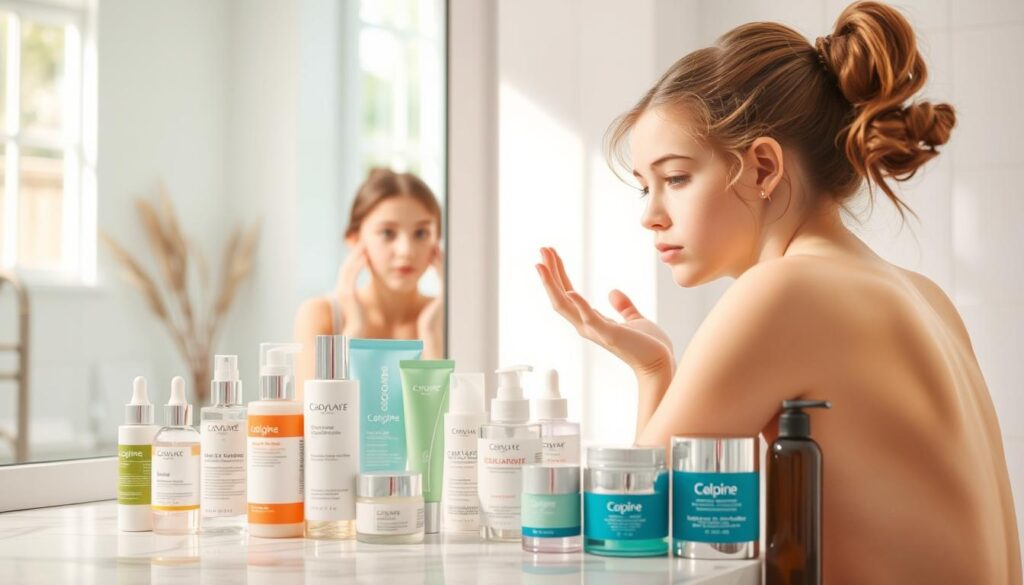
Common Skin Concerns During Adolescence
Teenagers often face a range of Skin concerns, including acne, excessive oiliness, and sensitivity. Understanding these issues is crucial for developing an effective skincare routine. Some common problems include:
- Acne and pimples
- Excessive oiliness
- Sensitivity and irritation
By addressing these concerns, teenagers can better manage their Skin health and reduce the risk of long-term damage.
Teenage Daily Skincare Guide: Essential Steps
Daily skincare for teens involves more than just washing their face; it’s about creating a habit that promotes long-term Skin health. A consistent routine helps in managing common teenage Skin issues such as acne, oiliness, and sensitivity.
The Three Non-Negotiable Steps
For teenagers, simplifying their skincare routine is key. There are three fundamental steps that form the backbone of any effective skincare regimen: cleansing, moisturizing, and sun protection.
- Cleansing: Washing the face twice a day with a gentle cleanser to remove dirt and excess oil.
- Moisturizing: Applying a moisturizer that suits your Skin type to keep it hydrated and balanced.
- Sun Protection: Using a broad-spectrum sunscreen with at least SPF 30 daily to prevent premature aging and Skin damage.
Adapting Your Routine to Your Skin Type
Understanding your Skin type is crucial for adapting your skincare routine effectively. Whether you have oily, dry, combination, or sensitive Skin, tailoring your products and steps can make a significant difference.
| Skin Type | Cleanser | Moisturizer | Additional Tips |
|---|---|---|---|
| Oily | Foaming or gel cleanser | Lightweight, oil-free moisturizer | Use clay masks to control oil. |
| Dry | Gentle, hydrating cleanser | Rich, emollient moisturizer | Avoid hot water and harsh products. |
| Combination | Balancing cleanser | Moisturizer for combination Skin | Focus on the T-zone for oil control. |
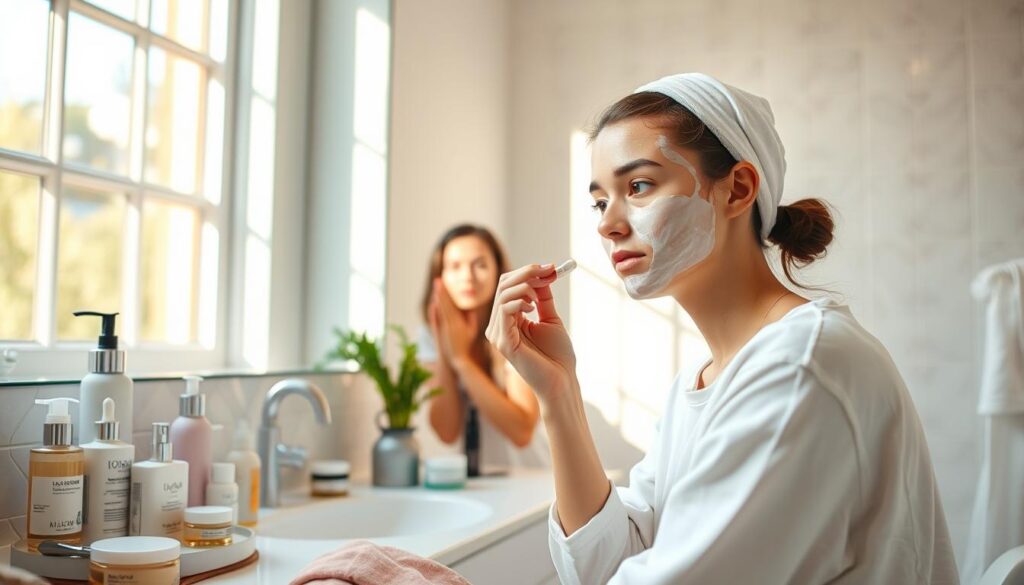
By following these essential steps and adapting them to your Skin type, you can achieve healthier, clearer Skin. Consistency and patience are key, as it may take some time to see improvements.
Morning Skincare Routine for Teens
Starting your day with a consistent morning skincare routine can significantly impact the health and appearance of your Skin. A well-structured routine helps in maintaining the Skin’s natural balance, preparing it for the day ahead.
Gentle Cleansing to Start Your Day
Gentle cleansing is the first step in any morning skincare routine. It removes overnight dirt and oil without stripping the Skin of its natural moisture. Using a gentle cleanser suitable for your Skin type is crucial.
Hydration and Moisture Balance
After cleansing, maintaining hydration and moisture balance is key. Applying a lightweight moisturizer helps keep the Skin hydrated throughout the day. It’s essential to choose a moisturizer that suits your Skin type to avoid clogging pores or drying out the Skin.
Sun Protection: A Lifetime Habit
Sun protection is a critical component of the morning skincare routine. Applying a broad-spectrum sunscreen with at least SPF 30 protects the Skin from UV damage, reducing the risk of premature aging and Skin cancer. Making sun protection a habit from a young age can have long-term benefits.
| Skincare Step | Product Recommendation | Benefits |
|---|---|---|
| Gentle Cleansing | Cetaphil Gentle Skin Cleanser | Removes dirt without stripping natural oils |
| Hydration | Neutrogena Hydro Boost Water Gel | Provides long-lasting hydration |
| Sun Protection | EltaMD UV Clear Broad-Spectrum SPF 46 | Protects against UV damage, suitable for acne-prone Skin |
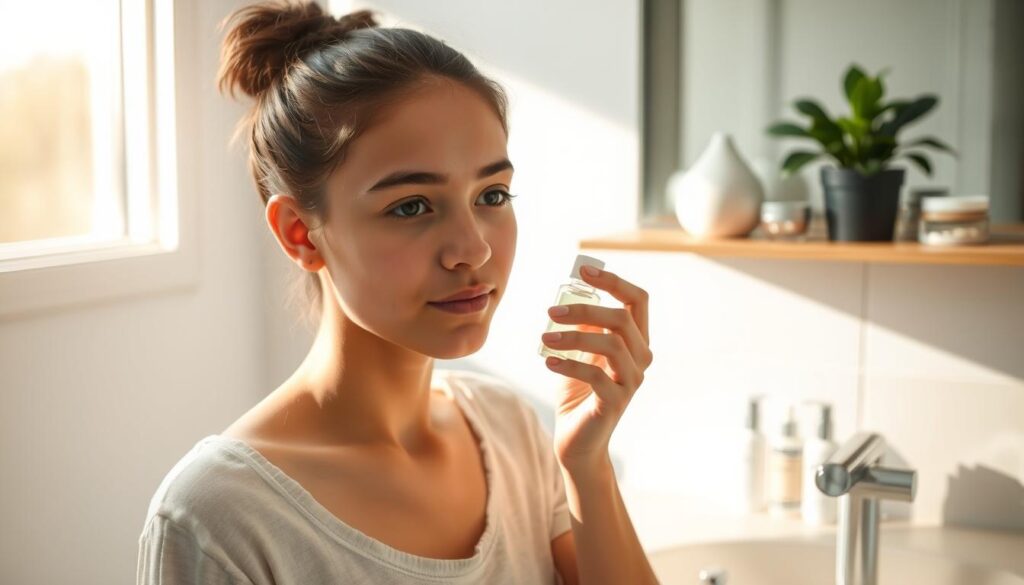
Evening Skincare Routine for Teens
Teens can benefit greatly from a well-structured evening skincare routine that addresses their Skin’s specific needs. This nightly regimen helps in removing the dirt and makeup accumulated throughout the day, treating Skin concerns, and preparing the Skin for the next day.
Removing Makeup and Daily Grime
The first step in any evening skincare routine is to cleanse the Skin thoroughly. This involves removing makeup and daily grime that can clog pores and cause breakouts. Use a gentle makeup remover followed by a cleanser suitable for your Skin type.
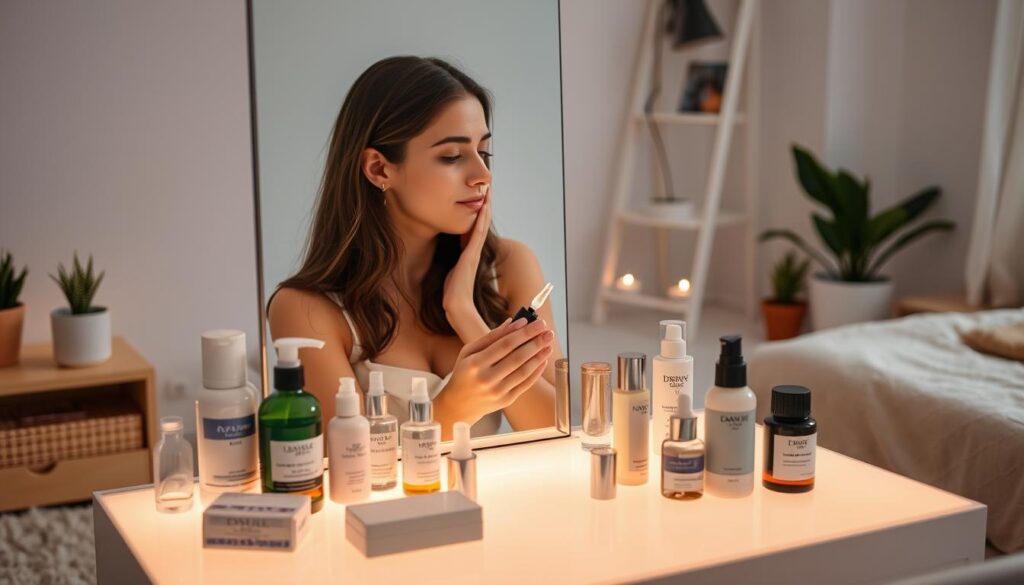
Treatment Products for Overnight Repair
After cleansing, apply treatment products designed for overnight repair. These products can contain ingredients like retinol, salicylic acid, or benzoyl peroxide that help in tackling acne, reducing fine lines, and improving Skin texture.
Nighttime Moisture Needs
Finally, moisturizing is crucial at night to help your Skin repair and hydrate while you sleep. Choose a moisturizer that matches your Skin type – whether it’s dry, oily, or combination. For teens with acne-prone Skin, look for non-comedogenic moisturizers that won’t clog pores.
| Product | Purpose | Skin Type |
|---|---|---|
| Gentle Cleanser | Remove dirt and makeup | All |
| Treatment Serum | Address Skin concerns like acne or aging | Oily, Dry, Combination |
| Moisturizer | Hydrate and protect the Skin | All |
Tackling Acne: Prevention and Treatment
The onset of puberty often brings with it the unwelcome visitor of acne, a condition that can be both frustrating and embarrassing. Acne is not just a cosmetic issue; it can affect a teenager’s self-esteem and confidence. Understanding and addressing acne effectively is crucial for both prevention and treatment.
Understanding Different Types of Breakouts
Acne can manifest in various forms, including whiteheads, blackheads, and inflammatory pimples. Whiteheads are closed comedones that appear as small, white bumps, while blackheads are open comedones that are darker due to oxidation. Inflammatory pimples are red, swollen, and can be painful. Recognizing the type of acne is the first step towards treating it effectively.
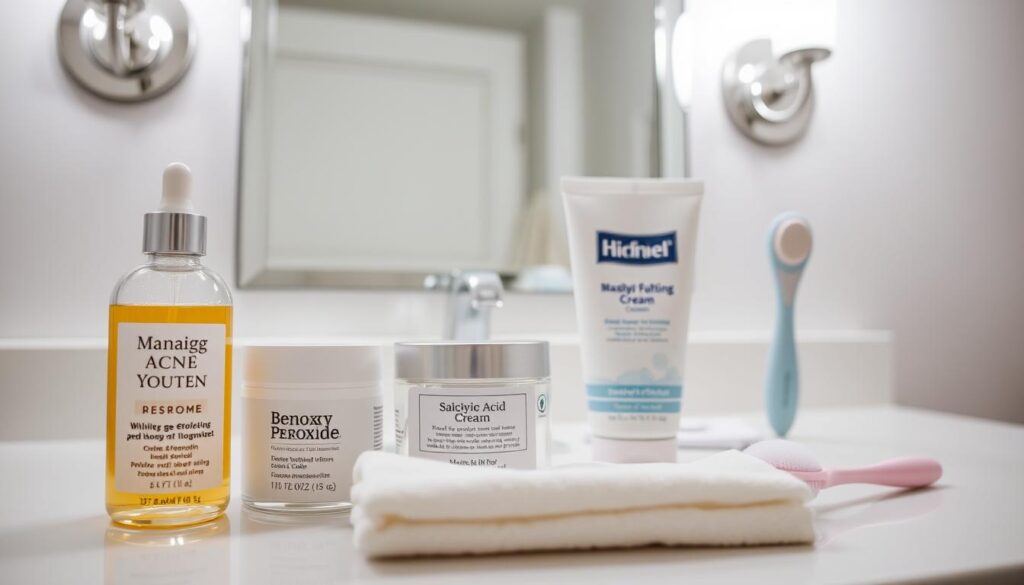
Effective Ingredients for Acne-Prone Skin
Certain ingredients have been proven to be effective in managing acne. Benzoyl peroxide is a well-known acne fighter that works by killing bacteria. Salicylic acid helps to unclog pores and reduce inflammation. Tea tree oil, with its antimicrobial properties, can also be beneficial. Incorporating products with these ingredients into a skincare routine can help control acne.
When to Seek Professional Help
While many cases of acne can be managed with over-the-counter treatments and good skincare habits, some may require professional attention. If acne is severe, persistent, or causing significant distress, it’s time to consult a dermatologist. They can provide personalized advice, prescribe stronger treatments if necessary, and help prevent long-term scarring.
Skincare Products Every Teen Should Consider
Navigating the world of skincare products can be overwhelming for teens, but knowing the essentials can make all the difference. With the right products, teens can establish a routine that addresses their specific Skin concerns, whether it’s acne, dryness, or sensitivity.
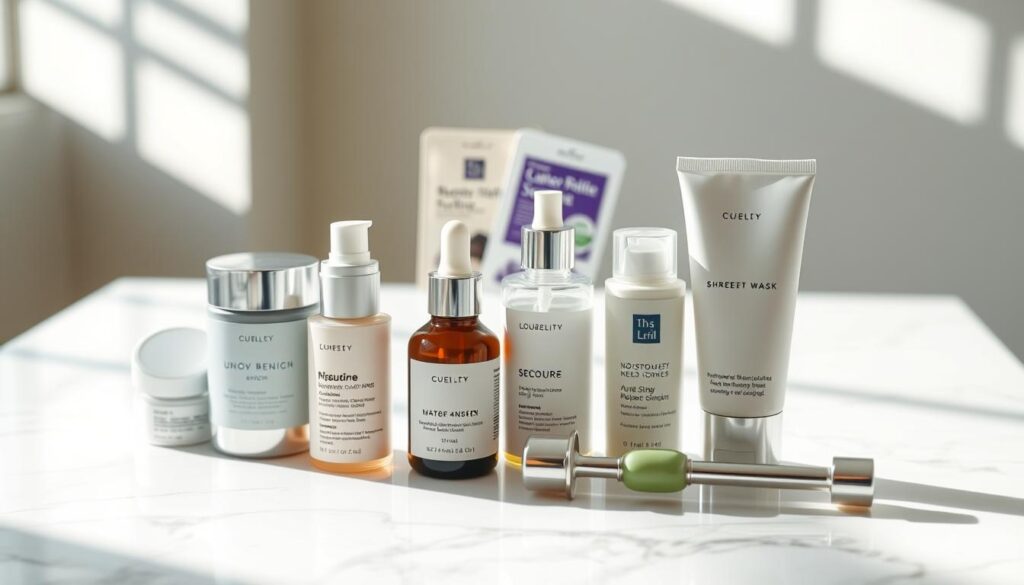
Budget-Friendly Cleansers
A good cleanser is the foundation of any skincare routine. For teens on a budget, options like CeraVe Hydrating Cleanser or Neutrogena Hydrating Facial Cleanser are effective and affordable. These cleansers gently remove dirt without stripping the Skin of its natural oils.
Effective Moisturizers for Young Skin
Moisturizers help lock in the benefits of other skincare products and keep the Skin hydrated. Teens should look for moisturizers that are labeled “non-comedogenic” or “oil-free” to avoid clogging pores. La Roche-Posay Toleriane Ultra Fluid is a great option for sensitive Skin, while Neutrogena Hydro Boost Water Gel provides lightweight hydration for oily Skin.
Sunscreens That Won’t Cause Breakouts
Sunscreen is crucial for preventing premature aging and Skin cancer. Teens should opt for sunscreens that are labeled “non-comedogenic” to avoid breakouts. EltaMD UV Clear Broad-Spectrum SPF 46 is a popular choice among dermatologists for its lightweight, oil-free formula.
Treatment Products Worth Trying
For teens dealing with acne or other Skin concerns, treatment products can be a game-changer. Ingredients like salicylic acid and benzoyl peroxide are effective against acne. Paula’s Choice 2% BHA Liquid exfoliates the Skin and unclogs pores, while Differin Acne Treatment Gel adapts to the Skin’s needs to reduce acne.
As quoted by a skincare expert, “Starting a skincare routine early can significantly impact the health and appearance of your Skin in the long run.” Establishing good skincare habits now can lead to a lifetime of benefits.
“The key to effective skincare is consistency and patience. It may take some trial and error to find the right products, but the payoff is worth it.”
Customizing Skincare for Different Teen Skin Types
Customizing your skincare routine to your specific Skin type is crucial for achieving healthy, glowing Skin during your teenage years. Different Skin types have unique needs, and understanding these needs is the key to an effective skincare routine.
Solutions for Oily and Acne-Prone Skin
For oily and acne-prone Skin, it’s essential to use products that control oil production and reduce acne. Look for cleansers containing salicylic acid or benzoyl peroxide, which help to unclog pores and reduce inflammation. Use a lightweight, oil-free moisturizer to keep your Skin hydrated without exacerbating oiliness.
- Use a gentle cleanser twice a day.
- Apply a spot treatment for acne.
- Moisturize with an oil-free product.
Caring for Dry and Sensitive Skin
If you have dry and sensitive Skin, focus on gentle, hydrating products that soothe and nourish your Skin. Avoid harsh exfoliants and opt for Fragrance-free cleansers and moisturizers. Look for products containing hyaluronic acid or ceramides, which help to lock in moisture and repair the Skin barrier.
Balancing Combination Skin
For combination Skin, the goal is to balance oily and dry areas. Use a gentle cleanser that won’t strip your Skin of its natural oils, and apply a lightweight moisturizer that hydrates without clogging pores. Consider using a mattifying product on oily areas and a more nourishing product on dry areas.
Addressing Skin Sensitivities and Allergies
If you have sensitive Skin or allergies, be cautious when introducing new products. Always patch test a new product on a small area of Skin before using it on your face. Look for hypoallergenic and Fragrance-free products to minimize the risk of irritation. 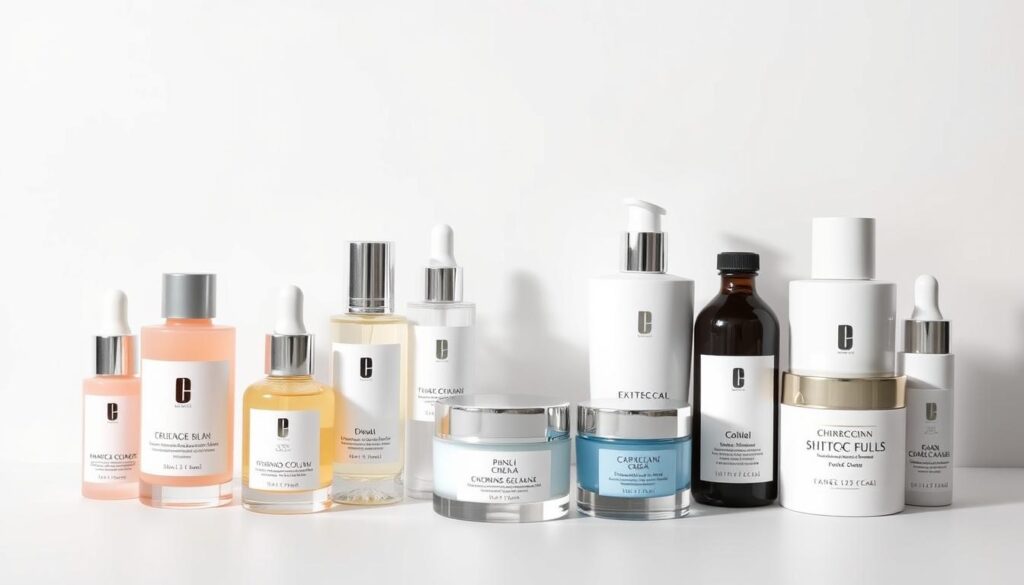
By understanding your Skin type and using the right products, you can create a skincare routine that works for you, not against you.
Common Skincare Mistakes Teens Make
Establishing a good skincare routine during the teenage years is vital, yet many teens fall into bad habits that can harm their Skin. Understanding these common pitfalls can help teens adjust their routines for healthier, clearer Skin.
Over-Cleansing and Harsh Products
One of the most common skincare mistakes teens make is over-cleansing their Skin or using harsh products that strip the Skin of its natural oils. This can lead to irritation, dryness, and even more oil production as the Skin tries to compensate for the loss. Instead, teens should opt for gentle, non-comedogenic cleansers that effectively clean the Skin without causing irritation.
Some key points to remember when choosing a cleanser include:
- Look for products labeled ‘non-comedogenic’ or ‘oil-free’ to avoid clogging pores.
- Avoid products with harsh ingredients like sulfates or alcohol.
- Consider a cleanser with soothing ingredients like aloe vera or green tea.
Picking and Popping: Why It’s a Bad Idea
Another detrimental habit some teens have is picking or popping pimples. This can lead to infection, scarring, and prolonged healing times. It’s essential for teens to understand that their Skin is sensitive and that such actions can have lasting consequences.
To avoid the temptation to pick or pop pimples, teens can:
- Keep their hands away from their face to reduce the risk of transferring bacteria.
- Use spot treatments that contain salicylic acid or benzoyl peroxide to help reduce acne.
- Keep themselves occupied with other activities to distract from the urge to pick at their Skin.
The Connection Between Diet, Lifestyle and Skin Health
Maintaining healthy Skin isn’t just about what you put on it, but also about what you put into your body. The food we eat, our hydration levels, sleep patterns, and stress management techniques all play a significant role in determining our Skin’s health.
Foods That May Trigger Breakouts
Certain foods can trigger or exacerbate acne. Dairy products and foods high in sugar are commonly associated with increased breakout risks. These foods can cause inflammation and increase sebum production, leading to clogged pores.
Hydration and Sleep: Your Skin’s Best Friends
Adequate hydration is crucial for maintaining Skin elasticity and moisture. Drinking enough water helps flush out toxins from the body, reducing the risk of Skin issues. Similarly, getting sufficient sleep allows your Skin to repair and regenerate, contributing to a healthier complexion.
Stress Management for Clearer Skin
High levels of stress can lead to hormonal imbalances, which may result in Skin problems like acne. Engaging in stress-reducing activities such as meditation, yoga, or deep breathing exercises can help manage stress levels, promoting clearer Skin.
As the saying goes, “You are what you eat.” A balanced diet rich in fruits, vegetables, and whole grains, combined with a healthy lifestyle, can significantly improve your Skin’s health.
“The food you eat can either be the safest and most powerful form of medicine, or the slowest form of poison.”
Making informed choices about your diet and lifestyle can be a powerful step towards achieving healthier, clearer Skin.
Debunking Teen Skincare Myths
As teens navigate the complex world of skincare, it’s essential to separate fact from fiction. With so much information available, it’s easy to get caught up in common myths that can do more harm than good.
Let’s dive into some of the most prevalent skincare myths that teens should be aware of. Understanding the truth behind these myths can help teens develop a more effective skincare routine.
The Truth About Chocolate and Acne
One of the most enduring myths is that eating chocolate causes acne. While it’s true that certain foods can trigger breakouts, the relationship between chocolate and acne is more complex. Research suggests that it’s not the chocolate itself, but rather the sugar and dairy often found in chocolate treats, that can contribute to acne. So, it’s not necessary to completely cut out chocolate, but being mindful of overall diet is crucial.
Misconceptions About Washing Frequency
Many teens believe that washing their face more frequently will help clear up their Skin. However, over-washing can strip the Skin of its natural oils, leading to dryness and potentially even more oil production as the Skin tries to compensate. The American Academy of Dermatology recommends washing your face twice a day with a gentle cleanser. This helps maintain a healthy balance without over-drying the Skin.
Sunscreen Myths That Harm Your Skin
Some teens think that sunscreen is only necessary on sunny days or that it’s too greasy for their Skin type. The truth is that sunscreen is essential every day, even on cloudy days, as UV rays can penetrate through the clouds. Look for a broad-spectrum sunscreen with an SPF of at least 30 that’s labeled “non-comedogenic” or “oil-free” to avoid clogging pores. Applying sunscreen daily can prevent premature aging and reduce the risk of Skin cancer.
By understanding and debunking these common skincare myths, teens can make more informed decisions about their skincare routines, leading to healthier, clearer Skin.
When to See a Dermatologist
As a teenager, figuring out when to see a dermatologist can be confusing, but there are clear signs to look out for. Your Skin is a reflection of your overall health, and certain conditions may require professional attention to prevent long-term damage or scarring.
Signs Your Skin Needs Professional Attention
If you’re experiencing persistent acne that doesn’t respond to over-the-counter treatments, it’s time to consider seeing a dermatologist. Other signs include unusual moles or Skin changes that could be indicative of more serious conditions. Additionally, if you’re unsure about the best skincare products for your Skin type or if you’re experiencing Skin irritation that won’t subside, professional advice can be invaluable.
| Signs | Description |
|---|---|
| Persistent Acne | Acne that doesn’t improve with over-the-counter treatments |
| Unusual Moles | Changes in mole size, color, or shape |
| Skin Irritation | Redness, itching, or rashes that persist |
What to Expect at Your First Dermatologist Visit
During your first visit, the dermatologist will examine your Skin thoroughly, discussing your medical history and any concerns you have. They may perform a Skin examination to check for any abnormalities and provide a diagnosis. Based on their findings, they will recommend a treatment plan tailored to your specific Skin needs, which could include prescription medications, lifestyle changes, or further testing if necessary.
Conclusion: Building Healthy Skin Habits for Life
Establishing a consistent skincare routine is crucial for teenagers to achieve healthy, glowing Skin that lasts a lifetime. By understanding your Skin type and concerns, you can create a personalized skincare plan that addresses your specific needs.
Healthy Skin habits, such as cleansing, moisturizing, and protecting your Skin from the sun, are essential for maintaining a clear and radiant complexion. A well-crafted skincare routine for teenagers can help prevent common issues like acne, dryness, and hyperpigmentation.
By adopting long-term skincare practices, teenagers can develop healthy habits that benefit their Skin for years to come. This includes being mindful of diet, lifestyle, and environmental factors that impact Skin health. By taking control of your Skin health, you can enjoy a lifetime of confidence and healthy, beautiful Skin.





